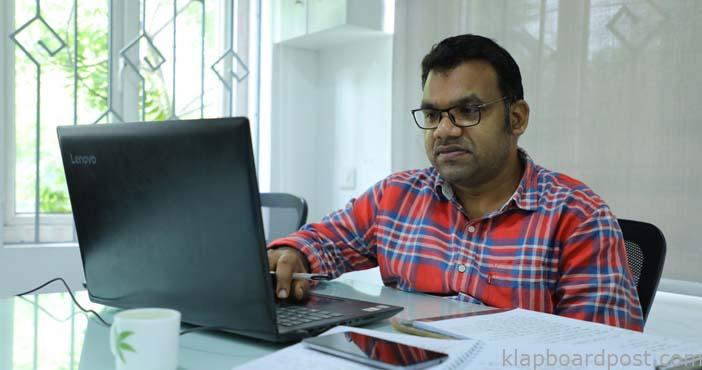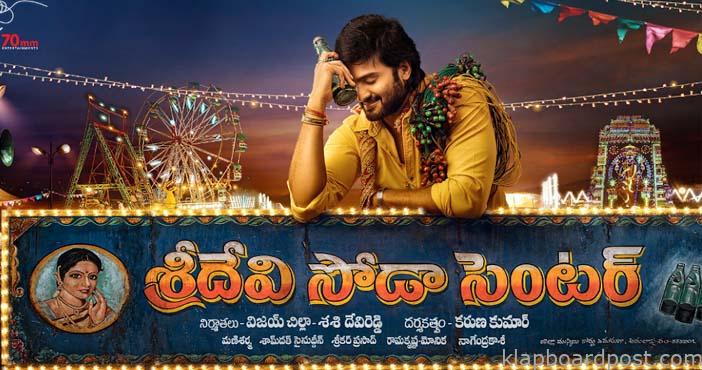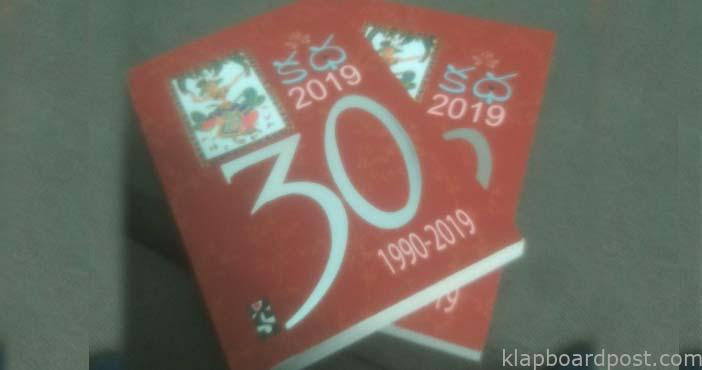Writer Nagendra Kasi hails from the beautiful, scenic Mummidivaram in East Godavari. Konaseema, its people and culture had influenced him a great deal and you would find many such references in his literary works. Kasi also saw many of director Vamsi’s films which had a Godavari backdrop, be it Ladies Tailor, Kanakamahalakshmi Recording Dance Troupe, Sitara etc. He concurs that sarcasm is an inbuilt character of the people of Godavari and they all enjoy healthy satire. The current generation has stepped out and moved to big cities and we don’t find such dialect in their conversations anymore he says.
In an interview with klapboardpost.com, Kasi talks about his journey as a story writer in the film industry and discusses the advantages of a writer turning into a director. He shares, “I am a voracious reader of novels. I read Amaravatri stories, works of Allam Seshagiri Rao etc in the initial years of my academics. I began writing stories from intermediate and realised that the way I was writing wasn’t correct and it needed a method. At one point, I knew it has to be a constructive one and that we have to build the character, we have to take people to the world and there should be relevance. We should be sincere about what we are writing. The first story was about people who were migrating to Kuwait (known as Koita in colloquial language). The story revolves around a married woman who goes to Kuwait and there is no news from her end other than what the agent would give. He would be the only source of communication. This woman returns after ten or fifteen years to her husband. She has married again. It is a very rooted story. The response for the work has been overwhelming and it made me believe I could be a good narrator. It was selected as the best story, another work of mine was staged and another was selected by TANA (The Telugu Association of North America) and they got it published.”
His friend Venkat Siddareddy got out an anthology..’In the mood for love’ in which the first story was written by Kasi. Director Sukumar liked it and told him he could anytime narrate his works for the making of a film. Many people in the film industry complimented him. Though Kasi always wanted to get into the movie industry, he decided to carve a niche for himself and then begin his foray. Now that his foundation had become strong, he took up Palasa. As a co-writer he won encomiums. He had written “Sridevi Soda Center’ and narrated it to Karuna Kumar, director of Palasa. The movie was mounted immediately and is done now and features Sudheer Babu as the hero. Does it help when a writer becomes a director? “I always want to be a writer but slowly changed my mind to direct a film. In the process of writing for Palasa and Sridevi Soda Center, I was fuelled by a desire to direct. If we find a director with the same thought process as the writer, there is harmony. If the director doesn’t reflect the writer’s thoughts, it becomes a dissapointment. The ideas remain as ideas and also essence is lost in translation. The USP of the film goes missing, so I came to a conclusion that if you want to tell a story, better direct it. I am moving ahead now.”
Going down memory lane, he talks about the struggle in Uttarandhra. “Palasa was set in a certain period. The struggle erupted in Bengal and moved to Uttarandhra. The movie Maa Bhoomi had a Telangana backdrop. There are many films such as this where the genre is humane and has an emotional drama. Palasa isn’t my story, it has many twists and turns and has been a continuous learning process. The fact that Karuna Kumar, the director hailed from Uttarandhra was of great help. The core human emotion won’t change even if you go to another part of the world to direct a film, if you establish the conflict point well. The nuances help in giving out core details and it is exciting to fill up the structure with emotions. If a director brings an outline and if it is an exciting element, if it has values, we can dig out more info and write something. I have the adaptability and I can write.”
A writer needs to move, mingle with people to bring the best, how does it help if a group of writers are in a room giving shape to a story? Kasi agrees and says if one is sitting comfortably in a room, he can’t write anything. Reading helps and so does characteristics of the people in the story but unless you observe the society, the reservoir in the mind will remain empty. Even if you see a foreign film, you can’t change it into a remake. What is needed here is experience, willingness to travel, reading and updating oneself. He adds, “I have seen many people, read newspapers, magazines and have connected with emotions. Without commerce there is no cinema. At the end of the day, it is business. The commercial aspect is certainly important. The way people look at cinema is different, they don’t like preaching. There should be relevance. In a naxal story, there is an option to show it as a documentary or a movie. If the latter is important, you have to make it commercially interesting. When I am writing a story, I feel I am the representative of many people in the society.”
Kasi further states that if it is a love story, there has to be a nostalgic drive. If we show what we went through people will connect. If we collect opinions, it won’t be interesting. We have an outlook about society. If we keep on thinking of satisfying every audience, it is difficult and we can’t write. We have to be sincere to ourselves and the story. He quips, “Maruti’s Eerojullo had double entendre, it became a hit. After its success, 100 films of the same genre followed but none of them could match that particular film’s success. There is something about Ee Rojullo which made it work. We cannot specifically point out a reason. To establish characters, directors take time and space to inject the point and show us what the film is about. Then whatever you say works. The characters are representative of the current society and so are the youth. They are the ones who flood the theatres and boost the opening collections. The target audience, genre, all this needs to be thought after the story is thought about. If it has a star hero..then we work it around him after analysing if the audience will accept a particular point or not. Another thing that is vital is the screenplay. It is a complete science of writing. The screenplay is an interplay between the conscious and the subconscious. You can write better when you have a better understanding of the craft.
We ask Kasi, why zillion stories rot even after registration at the writers union and why the writers never get a chance to work for a film. Kasi says, “A better script can never be rejected. If a story is good it will take you to another level. The story searches itself for its characters. People write something when they get excited about some concept. The vague script will never see the light as it lacks a proper construction.” Finally ask him if had an objection from the hero which is female centric. Kasi says, “Years ago, super stars like ANR and NTR worked in a film titled Gundamma Katha. They never had a problem. Even this generation has no problem with Sridevi Soda Center or Aravinda Sametha or Attarintiki Daredi.”













